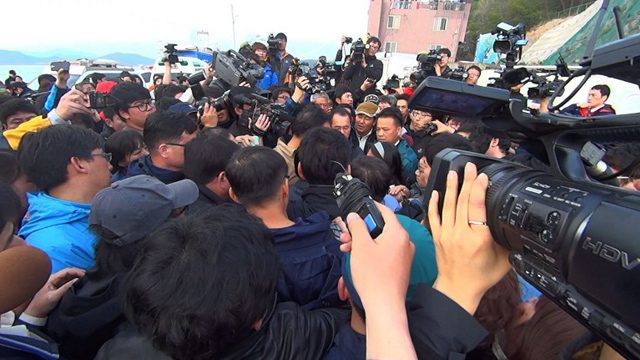SUMMARY
This is AI generated summarization, which may have errors. For context, always refer to the full article.

BUSAN, South Korea – A South Korean documentary about the Sewol ferry disaster has stoked controversy ahead of Thursday’s opening of Asia’s pre-eminent film festival in the port city of Busan.
The world premiere of Diving Bell from directors Lee Sang-Ho and Ahn Hae-Ryong will screen on Monday at the 19th Busan International Film Festival (BIFF).
The film has already stirred emotions in a nation still recovering from the shock of the April disaster that claimed more than 300 lives — including those of 250 high school students.
The diving bell of the title was a piece of specialised equipment that was drafted in for the widely-criticized rescue and recovery operation, but hardly used.
Critics, including a small number of the Sewol victims’ families, say the film is insensitive and overly politicized, and have called on the festival organizers to scrap the screening.
Busan mayor Seo Byung-soo, who is also chairman of the BIFF committee, argued that as the festival is 60 percent funded by the taxpayer, such a contentious screening should not be considered unless “the filmmakers … decide to show the film using their private funds”.
However, festival organizers have stood by their decision to screen the film while Korean filmmakers have called for a full government inquiry into the Sewol disaster and are reportedly planning a press conference during the event.
– Star power –
With an Asian festival calendar now jam-packed with events all vying for prominence and importance, the Busan event is turning to star power to attract attention with a guest list that includes Oscar-nominated Chinese director Zhang Yimou (Hero), actors Ken Watanabe and Tang Wei (Lust, Caution), as well as international art house directors Bela Tarr and Mohsen Makhmalbaf.
The festival will be showcasing films – including nearly 100 premieres – from 79 countries including the relatively small filmmaking communities of Bangladesh, Nepal, Lebanon and Iraq.
Busan’s “Korean Cinema Today” program boasts nine world premieres in a showcase of the country’s independent directors, including Hong Seok-jae’s hotly anticipated Socialphobia which tackles issues of cyber bullying.
The festival’s main award – New Currents – offers two prizes of US$30,000 to first- or second-time Asian filmmakers. This year it will be contested by a field of 12 films from 12 countries including – for the first time – Bangladesh (Abu Shahed Emon’s Jalal’s Story) and Lebanon (Amin Dora’s Ghadi).
‘Bringing talent together’
While Busan has traditionally been seen as the region’s top film festival, the Chinese market is increasingly making its presence felt as the world’s second biggest in terms of turnover.
China’s Dalian Wanda Group recently announced an agreement of support with Hollywood’s Academy of Motion Picture Arts and Sciences which will see them jointly host the Qingdao International Film Festival in the eastern port city every September from 2016. The eastern coastal province of Zhejiang has unveiled plans to host a “Cannes style” film festival in the near future.
“They are partners to cooperate with, not competitors,” said Kim Young-woo, BIFF’s Asian cinema programmer.
“We keep good relationships with film festivals and exchange information. So BIFF will continue to work with them to collaborate as good partners for one another.”
The festival opens with Doze Niu’s cross-strait drama Paradise in Service, set in the 1960s around a time of heightened tension between Taiwan and China. The Taiwanese director said Busan played an important role in bringing film talent together.
“It’s the best exchange platform (for filmmakers),” he said.
“And the subsidies and incentives provided by Busan have directly led to many film collaborations and interactions in Asia. That’s all very meaningful.”
The region’s box office importance is reflected in the four-day Asian Film Market which runs during the festival and includes efforts to promote more international collaborations.
The Busan festival runs from October 2-11 and will close with the world premiere of Hong Kong director Lee Bo Cheung’s thriller Gangster Pay Day. – Rappler.com
Add a comment
How does this make you feel?
There are no comments yet. Add your comment to start the conversation.